What Happens If You Put Diesel In A Gas Car
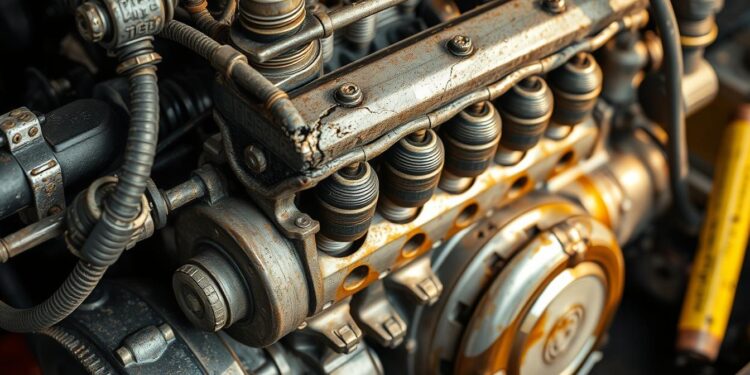
Putting the wrong fuel in your car can be a big mistake. It’s not just a small problem; it can cause serious damage to your engine. This can lead to expensive repairs.
Diesel and gasoline are not the same. They burn differently. If diesel gets into a gas engine, it can cause big problems. These problems can affect how well your car runs and even its structure.
It’s easy to make a mistake and put diesel in a gas car. This mistake can lead to many issues. These can range from small problems to complete engine failure.
Table of Contents
- 1 Understanding Fuel Types and Their Differences
- 2 Common Causes of Misfueling Incidents
- 3 Immediate Signs of Diesel Contamination in a Gas Engine
- 4 What Happens If You Put Diesel In A Gas Car
- 5 The Science Behind Diesel-Gasoline Contamination
- 6 Potential Damage to Engine Components
- 7 Short-Term Effects on Vehicle Performance
- 8 Long-Term Consequences of Diesel Contamination
- 9 Steps to Take After Misfueling
- 10 Cost Implications of Diesel Contamination Repair
- 11 Prevention Methods and Safety Measures
- 12 Professional Repair Process Explained
- 13 Insurance Coverage for Misfueling Incidents
- 14 Recovery Time and Vehicle Rehabilitation
- 15 Environmental Impact of Fuel Mixing
- 16 Conclusion
Key Takeaways
- Diesel in a gas car can cause serious engine damage
- Repair costs can range from $300 to thousands of dollars
- Immediate professional intervention is critical
- Even small amounts of diesel can impact engine performance
- Prevention is always better than costly repairs
Understanding Fuel Types and Their Differences
Vehicle owners need to know the big differences between diesel and gasoline. This is to avoid expensive mistakes when filling up. Gasoline and diesel engines work in different ways, each suited for its own fuel type.
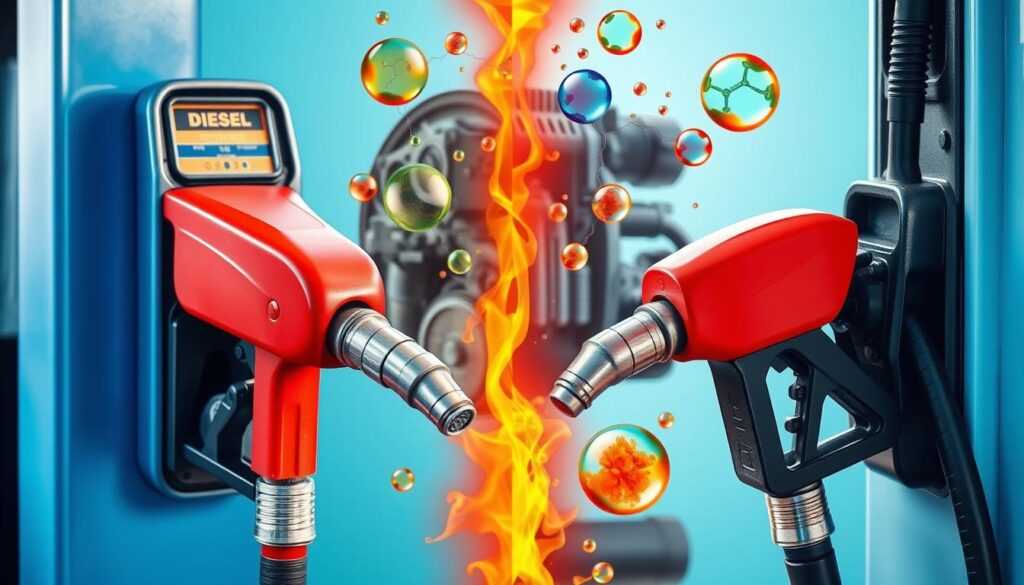
Putting the wrong fuel in your tank can cause serious problems. It’s important to understand these differences to avoid accidents.
Chemical Composition Explained
Diesel and gasoline are made of different chemicals. This affects how they work in engines:
- Diesel fuel is denser and more viscous
- Gasoline is lighter and more volatile
- Diesel contains more energy per gallon
Octane Ratings and Fuel Properties
| Fuel Type | Octane Rating | Energy Density |
|---|---|---|
| Gasoline | 87-91 | Lower energy content |
| Diesel | 25-30 | 20% more energy density |
Engine Performance Characteristics
Diesel and gasoline engines are very different. Diesel engines can handle higher compression, making them more efficient and lasting longer. They also give more torque and better fuel economy than gasoline engines.
“Understanding your vehicle’s fuel requirements is the first step in preventing costly mechanical damage.”
Diesel fuel pumps have bigger nozzles to stop wrong fueling. This shows how important it is to know the fuel type differences.
Common Causes of Misfueling Incidents
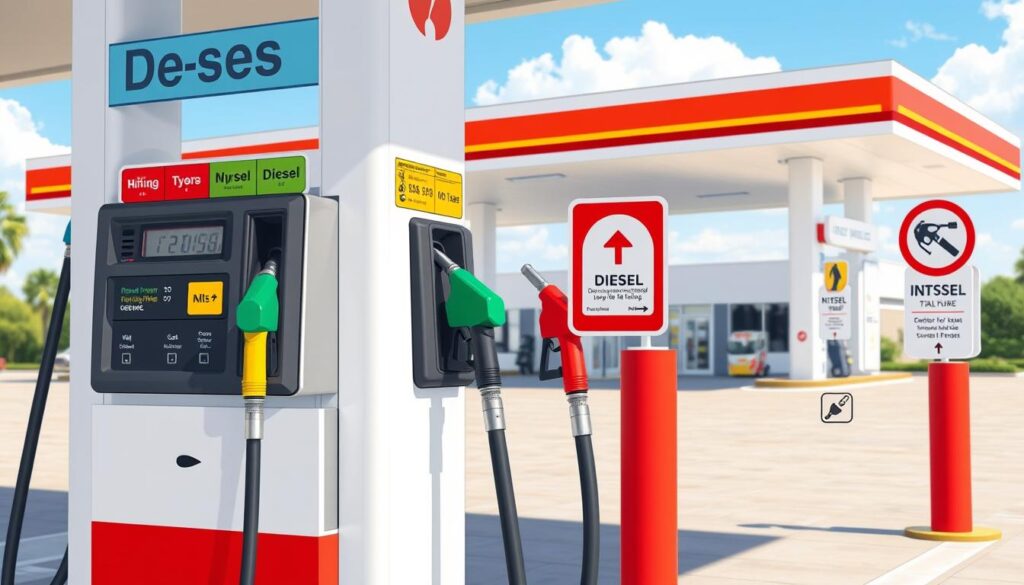
Accidental misfueling is a common problem that surprises many drivers. It happens even with safety measures at fuel stations. Diesel getting into unleaded tanks is a frequent issue.
Several factors lead to these incidents:
- Driver distraction during refueling
- Fatigue and mental exhaustion
- Unfamiliar rental or borrowed vehicles
- Poorly labeled fuel pump stations
- Similar nozzle designs across different fuel types
“One moment of inattention can lead to costly vehicle damage” – Automotive Safety Expert
Most misfueling happens because of brief distractions. Drivers might be stressed, in a hurry, or using a new vehicle. These moments can cause big problems.
| Misfueling Risk Factors | Probability |
|---|---|
| Driver Distraction | 42% |
| Vehicle Unfamiliarity | 25% |
| Confusing Fuel Pumps | 18% |
| Mental Fatigue | 15% |
Knowing these risk factors helps drivers stay alert and avoid misfueling disasters.
Immediate Signs of Diesel Contamination in a Gas Engine
Putting diesel in a gas engine can cause serious problems right away. Drivers need to spot these signs fast to avoid big engine damage.
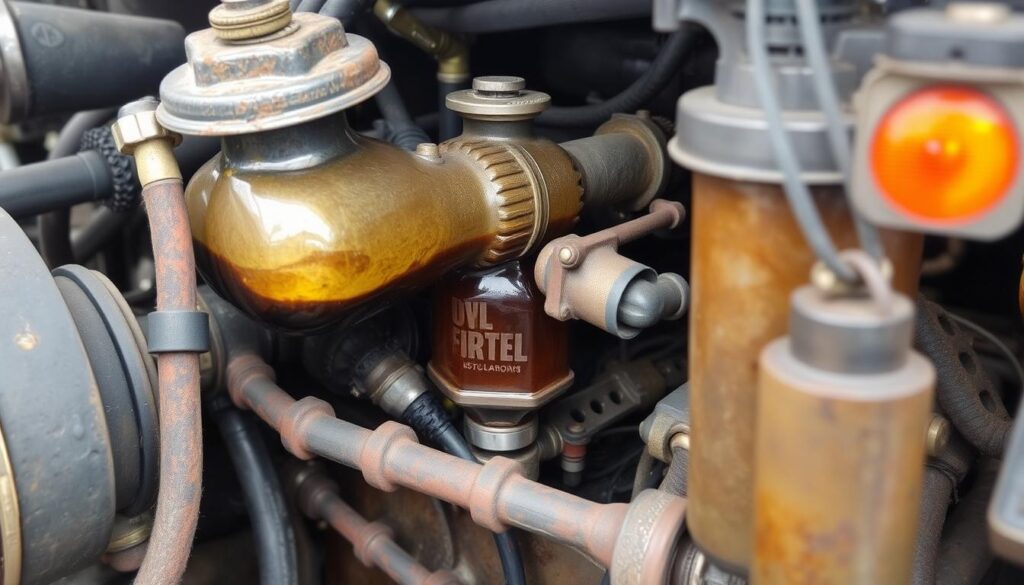
When diesel gets into a gas engine, several symptoms pop up quickly. These signs warn of big system problems:
Engine Performance Indicators
Drivers will see big performance drops when diesel gets into their gas engine:
- Dramatic power loss
- Hard acceleration
- Engine hesitation while driving
- Loss of smooth operation
Unusual Exhaust Characteristics
The exhaust system shows clear signs of fuel contamination:
- Dense, dark smoke
- Thick, bluish-gray exhaust
- More smoke than usual
Starting and Noise Complications
Diesel contamination messes with engine start-up and sound:
- Hard to start engine
- Rough idling
- Knocking or rattling sounds
- Potential misfiring
Even a little diesel, 1% to 2%, can cause engine problems.
Fixing these issues can cost $500 to $1,500. If the damage is worse, it could be $3,000 or more.
| Contamination Level | Potential Symptoms | Recommended Action |
|---|---|---|
| 1-2% Diesel | Minor performance issues | Professional fuel system flush |
| 5-10% Diesel | Significant engine strain | Immediate professional inspection |
| 10%+ Diesel | Potential complete engine failure | Complete engine system evaluation |
Spotting these symptoms fast can stop major engine damage. It also helps avoid high repair costs.
What Happens If You Put Diesel In A Gas Car
Misfueling can cause serious damage to your car’s engine. When you put diesel in a gas car, many problems start. This is because diesel and gasoline are very different in how they work.
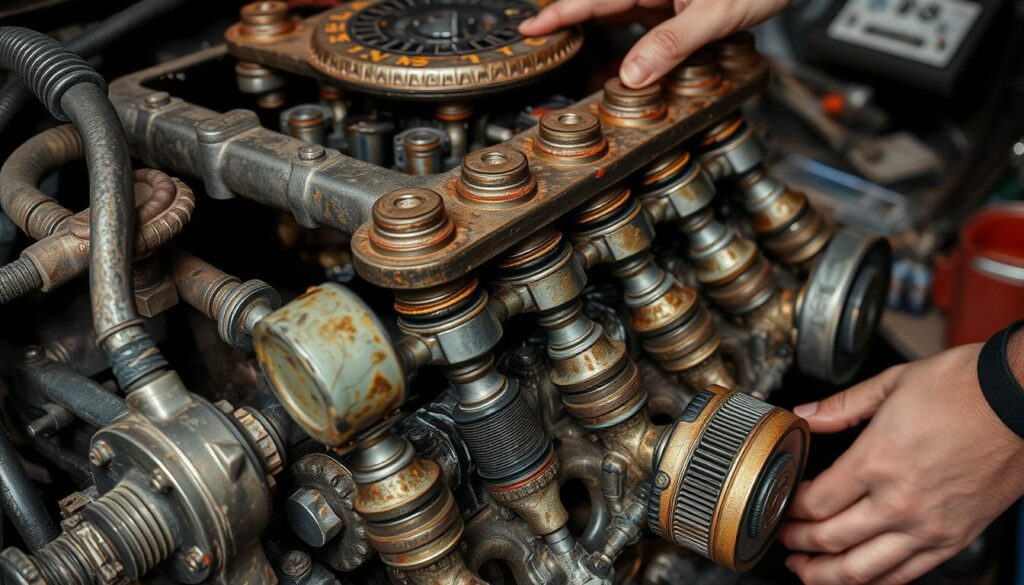
The first signs of trouble depend on how much diesel you put in. A little might let the car run, but too much can stop it cold.
- Small diesel contamination (2-3 gallons): Possible reduced performance
- Moderate diesel mixture: Engine might misfire and parts could get damaged
- Large diesel volume: The engine will likely shut down completely
A 2011 study on an Infiniti G25 showed how serious diesel contamination can be. After just 2 miles, the car was no longer working.
“Diesel fuel’s viscosity and chemical properties make it fundamentally incompatible with gasoline engines.” – Automotive Engineering Research Group
Diesel’s unique traits cause big problems:
| Fuel Property | Gasoline | Diesel |
|---|---|---|
| Octane Rating | 87-91 | 25-30 |
| Ignition Temperature | Higher | Lower |
| Combustion Process | Spark-initiated | Compression-initiated |
Fixing a misfueling issue can cost a lot, from hundreds to thousands of dollars. Replacing parts like fuel injectors and pumps can make the bill even higher.
Getting help from a pro is key to avoiding more damage if diesel gets into a gas car.
The Science Behind Diesel-Gasoline Contamination
Diesel in a gasoline engine is a big problem. It can really mess with the engine. Knowing how these fuels interact helps us understand the issues.
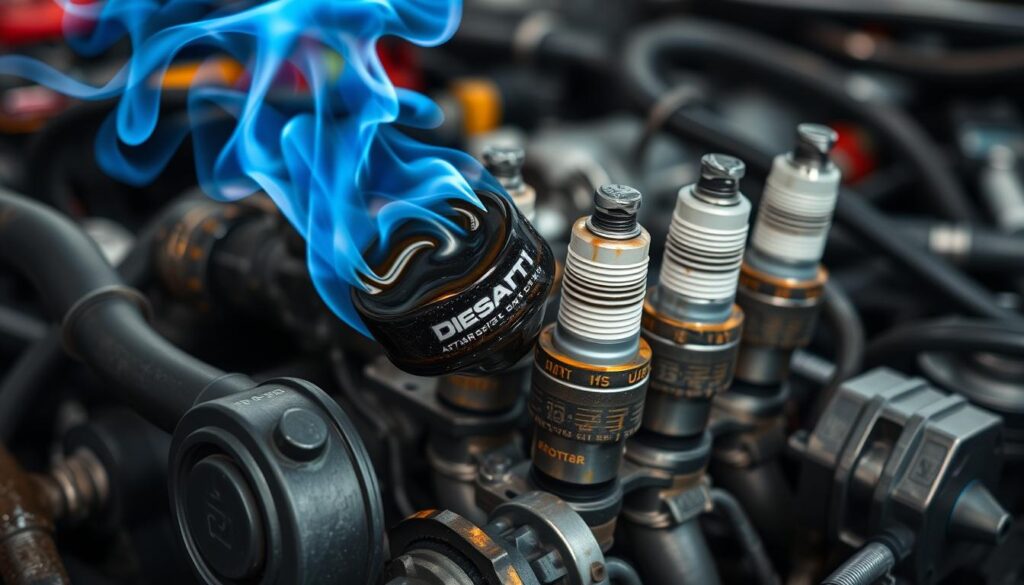
When diesel gets into a gasoline engine, it’s a big deal. Diesel and gasoline are very different. This difference can really hurt how the engine works.
Combustion Process Disruption
Diesel and gasoline burn in different ways. The main differences are:
- Diesel has a much lower octane rating than gasoline.
- Diesel’s chemical makeup makes it hard to ignite.
- The compression ratios for diesel and gasoline are not the same.
Fuel System Impact
Diesel in a gasoline engine causes many problems:
| Component | Potential Damage |
|---|---|
| Fuel Injectors | Clogging and possible permanent damage |
| Fuel Pump | Less lubrication and more wear |
| Combustion Chamber | Not burning fuel fully and carbon buildup |
Experts say even a little diesel can harm the whole fuel system. This could lead to costly fixes.
“Diesel and gasoline are fundamentally different fuels designed for specific engine architectures.” – Automotive Engineering Specialist
Potential Damage to Engine Components
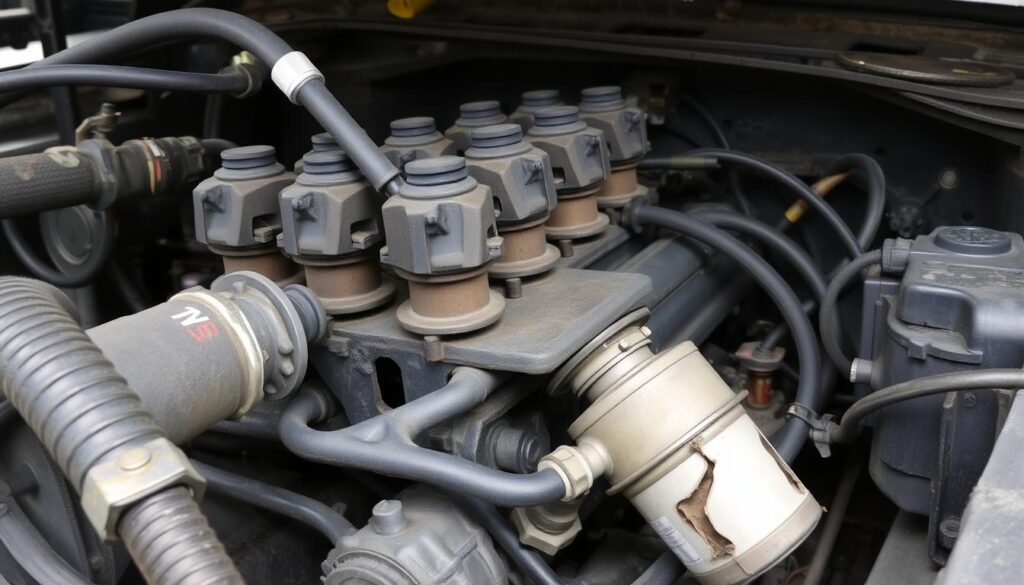
Misfueling can severely harm a vehicle’s engine. When diesel fuel gets into a gasoline engine, many parts are at risk. Diesel’s unique chemistry can damage the engine’s complex parts.
The main parts that can be damaged by diesel include:
- Fuel injectors
- Fuel pump
- Spark plugs
- Catalytic converter
- Pistons and cylinder walls
Diesel fuel has a lower octane rating than gasoline. This makes it hard for gasoline engines to burn. It also lacks the lubrication gasoline has, which can harm engine parts.
“Less than 50% diesel contamination might allow limited vehicle operation, but complete system replacement could be necessary.”
Some serious damages include:
- Clogged fuel injectors
- Compromised fuel system integrity
- Potential complete engine failure
| Component | Potential Damage | Estimated Repair Cost |
|---|---|---|
| Fuel Injectors | Severe clogging | $500-$1,500 |
| Fuel Pump | Mechanical breakdown | $1,000-$2,500 |
| Catalytic Converter | Complete replacement | $1,500-$3,000 |
Getting professional help right away is key. It helps avoid more damage and high repair costs.
Short-Term Effects on Vehicle Performance
When diesel fuel gets into a gas tank, drivers see big problems right away. The mix-up messes with the engine, making it hard to run and could harm it for a long time.
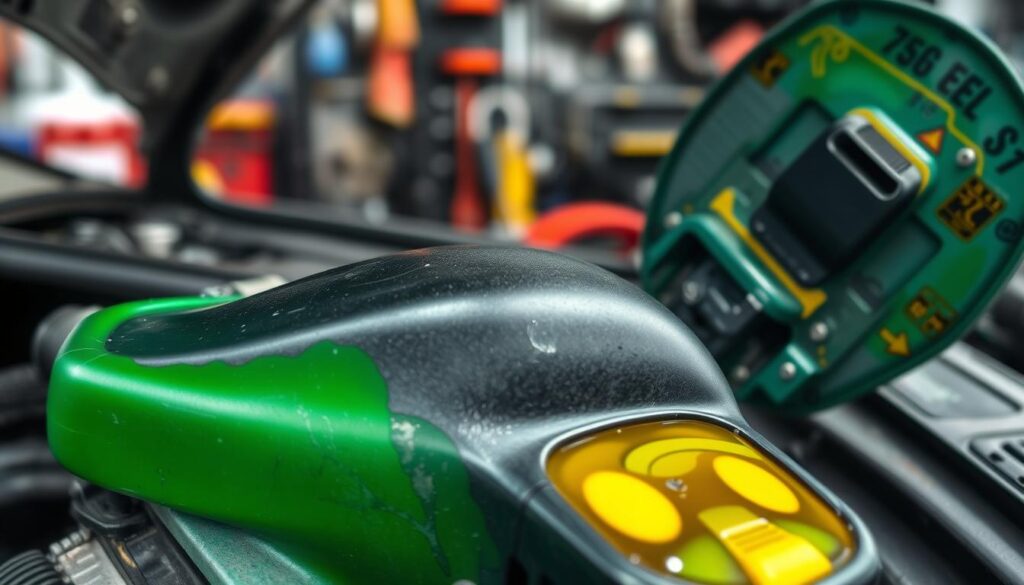
Diesel and gasoline burn differently. Diesel’s thick and chemical makeup can hurt a gas engine’s sensitive parts.
Power Loss and Acceleration Issues
Engine damage from diesel shows up in several ways:
- Engine power drops a lot
- It takes longer to speed up
- Fuel use goes down
- It struggles with simple tasks
Engine Misfiring and Rough Idling
Drivers face tough signs of diesel contamination:
- Engine misfires a lot
- Idling is rough and shaky
- Keeping engine speed steady is hard
- It might stall while running
| Performance Indicator | Diesel Contamination Effect |
|---|---|
| Power Output | Reduced by 20-40% |
| Fuel Efficiency | Decreased by 15-25% |
| Engine Responsiveness | Significantly Impaired |
“The moment diesel enters a gasoline engine, the vehicle’s performance begins to deteriorate rapidly.” – Automotive Engineering Experts
Quick help from a pro is key to avoid big engine damage and expensive fixes.
Long-Term Consequences of Diesel Contamination
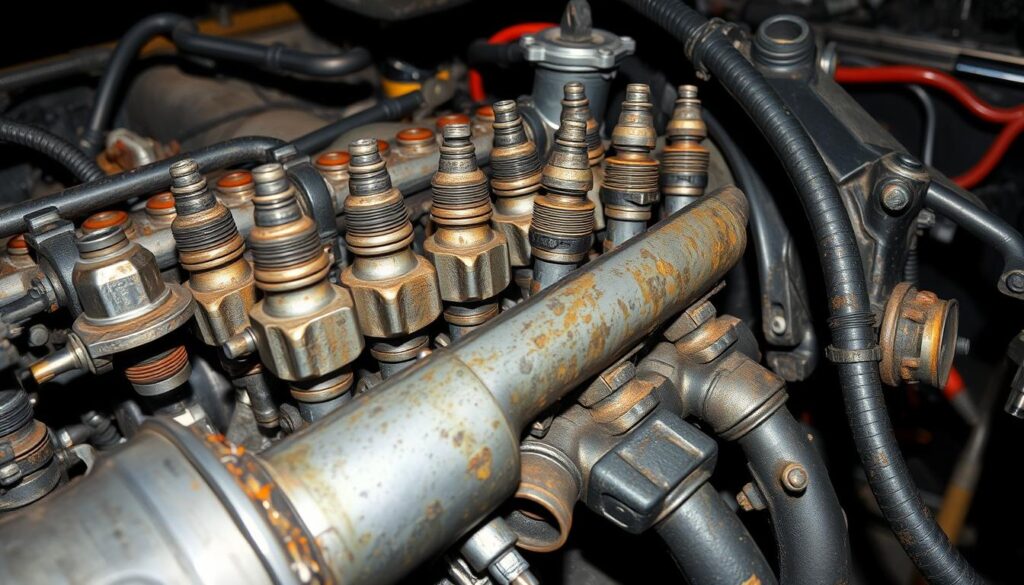
Diesel in a gasoline engine can cause serious long-term problems. These issues go beyond just immediate performance issues. Fuel contamination can lead to a series of mechanical problems that can harm the whole vehicle.
The presence of diesel fuel in a gasoline engine causes slow but serious damage:
- Engine parts wear out faster
- Fuel system can fail early
- Vehicle performance drops a lot
- Engine might need to be replaced
Several mechanical issues arise from diesel contamination. Fuel injector nozzles face a lot of stress. This can cause blockages and erosion. Studies show that contaminated fuel can:
- Reduce power output by up to 25%
- Make fuel consumption 15-30% higher
- Double the risk of injector valve seat failure
“Ignoring diesel contamination can turn a small problem into a big repair disaster.”
Fixing these problems can be very expensive. Costs can be between $1,000 and $5,000. Getting professional help can cost $300 to $600. This makes it important to act early to avoid more damage.
Car owners need to understand diesel contamination is a big deal. It’s not just a short-term issue. It’s a serious threat to the engine’s life, performance, and reliability.
Steps to Take After Misfueling
Accidental misfueling can be very stressful for drivers. About 150,000 people face this issue each year. It’s important to know what to do if you put diesel in a gas car.
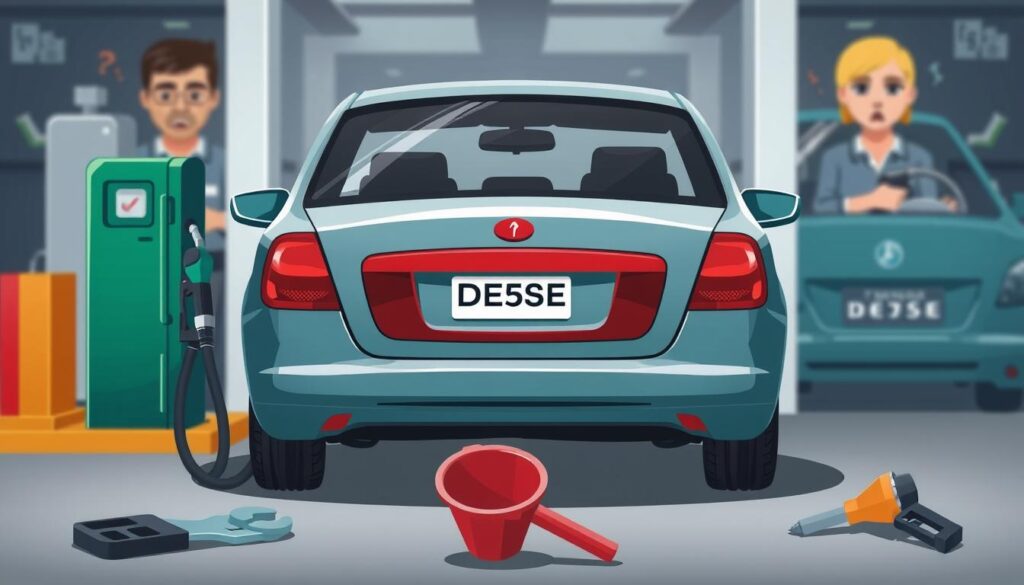
When you realize you’ve made a misfueling mistake, you need to act fast. The wrong fuel can seriously damage your car’s engine.
Immediate Actions to Protect Your Vehicle
- Do not start the engine under any circumstances
- Keep the key out of the ignition
- Put the car in neutral
- Move the vehicle to a safe location if possible
Professional Assistance Options
Getting professional help is key when you accidentally put the wrong fuel in your car. Experts suggest the following steps:
- Call a specialized fuel drain service immediately
- Contact a professional mechanic experienced in fuel system repairs
- Request a tow truck if you cannot move the vehicle
- Document the incident for insurance claims
“Prompt action can save your engine from costly damage” – Automotive Experts
| Action | Recommended Timeframe |
|---|---|
| Stop Driving | Immediately |
| Call Professional Service | Within 1 Hour |
| Fuel System Drain | As Soon as Possible |
The RAC says their fuel patrols can fix about 80% of misfueling problems right away. Time is of the essence when dealing with accidental misfueling to avoid engine damage.
Cost Implications of Diesel Contamination Repair
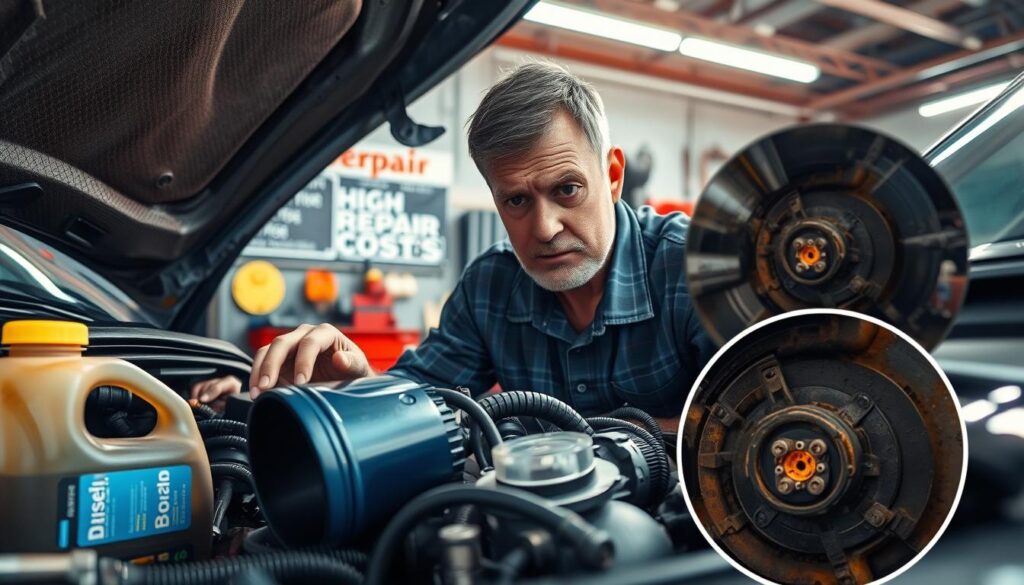
Misfueling can cause big financial problems for car owners. The cost to fix engine damage from diesel contamination varies a lot. This affects both personal car owners and businesses.
Repair costs depend on several important factors:
- How bad the fuel system contamination is
- The type of vehicle
- What the local mechanic charges
- What parts need to be replaced
The costs can be broken down into different areas:
| Repair Service | Estimated Cost Range |
|---|---|
| Fuel Tank Draining | $200 – $500 |
| Fuel Line Contamination Repair | $1,500 – $2,000 |
| Fuel Pump Replacement | $500 – $1,200 |
| Comprehensive Fuel System Cleaning | $150 – $700 |
Professional mechanics say acting fast can help avoid more damage and save money.
“Prevention is always more cost-effective than extensive engine repairs” – Automotive Expert
For businesses that use diesel vehicles, the costs are even higher. The time a vehicle is out of service can cost between $500 to $2,000 per day.
Knowing these costs shows why it’s key to be careful with fuel and stay informed to avoid expensive mistakes.
Prevention Methods and Safety Measures
Accidental misfueling is a big worry for drivers in the United States. To stop wrong fuel type issues, we need tech and driver education.
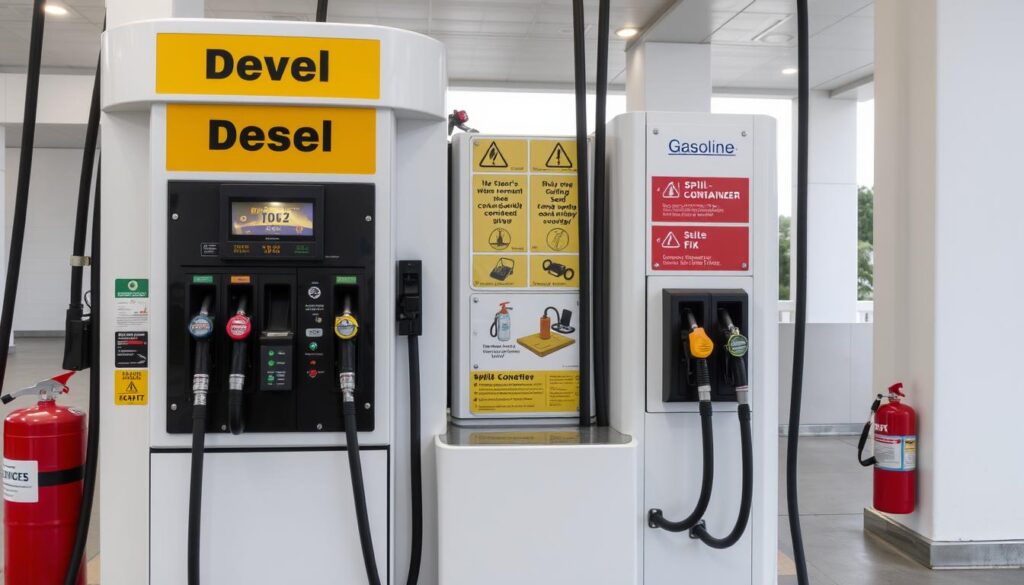
Gas stations have put in place many safety steps to lower misfueling risks. The main step is special fuel pump designs that make diesel spills hard to happen.
Fuel Pump Design Features
Modern gas stations use new safety features to stop wrong fuel mistakes:
- Diesel nozzles are about 30% bigger than gas nozzles
- Color-coded pump handles (green or yellow for diesel)
- Nozzle shapes that stop wrong insertion
Driver Awareness Tips
Drivers can do a lot to avoid wrong fuel mistakes:
- Always check fuel type labels before filling up
- Notice the color of the pump handles
- Use fuel cap reminders or stickers
- Teach all drivers in your household about right fueling
Studies show that up to 80% of misfueling incidents can be stopped with attention and design help. About 10% of drivers have had a misfueling problem, showing why these steps are key.
“Awareness and careful observation are your best defense against costly fuel system damage.” – Automotive Safety Expert
Additional Prevention Strategies
| Prevention Method | Effectiveness |
|---|---|
| Nozzle Size Difference | 80% Reduction in Misfueling |
| Color-Coded Handles | 70% Improved Recognition |
| Driver Education | 65% Increased Awareness |
Just a few extra seconds to check the fuel type can save a lot of money. It also prevents big damage to your vehicle.
Professional Repair Process Explained
When diesel fuel gets into a gas car’s system, quick professional help is key to avoid big engine problems. Mechanics use a detailed plan to find and fix diesel contamination. This makes sure the car runs well again.
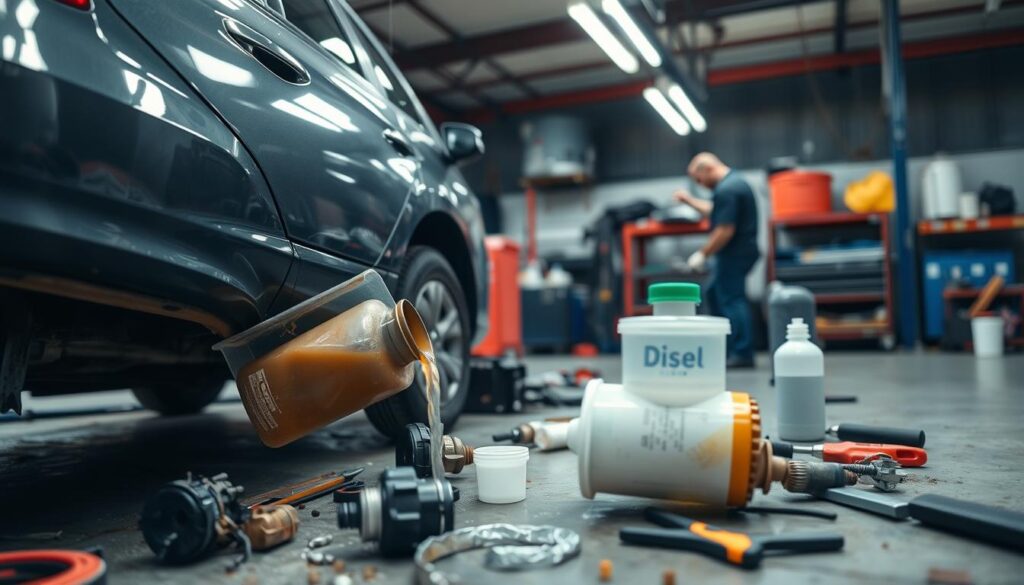
- Comprehensive fuel system diagnostic assessment
- Complete drainage of contaminated diesel fuel in gas tank
- Thorough cleaning of fuel lines and injection system
- Replacement of potentially damaged components
Experts use special tools to get diesel fuel out of the engine’s complex parts. The cost to fix this can be $1,500 to $2,000. This depends on how much damage the diesel contamination caused.
“Immediate professional intervention can significantly reduce long-term vehicle damage and repair expenses.”
Important parts to fix include:
- Fuel pump inspection and possible replacement
- Spark plug check and cleaning
- Catalytic converter check
- Fuel injector system check
Experts suggest a full system flush to get rid of any leftover diesel fuel. This can cause problems later. The fix usually takes 1-3 days, making sure the car’s fuel system is fixed right.
It’s also important to keep detailed records of the repair. This is for insurance claims and keeping track of the car’s maintenance in the future.
Insurance Coverage for Misfueling Incidents
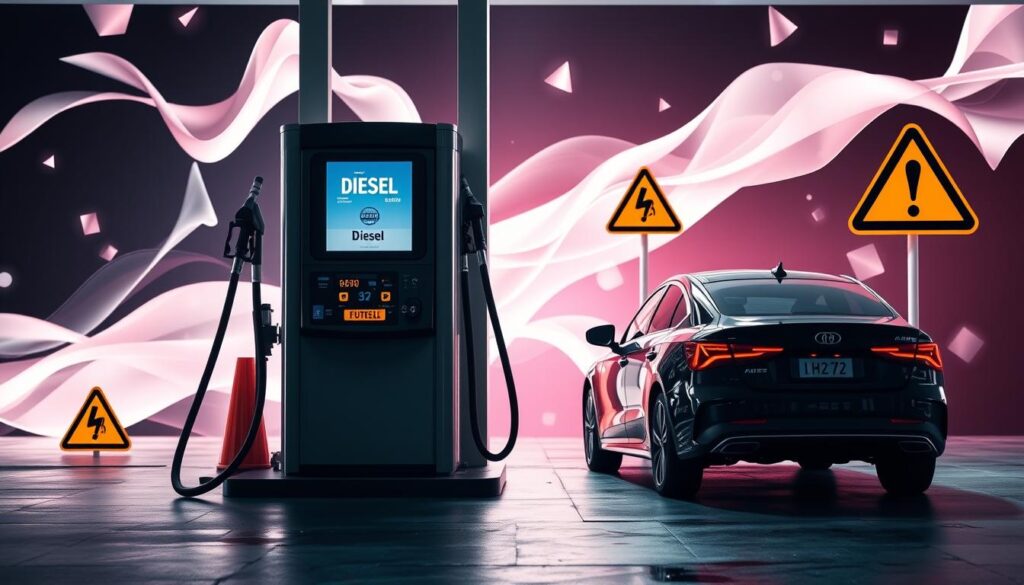
Understanding insurance for misfueling can be tough for car owners. Accidental misfueling brings up many financial risks and limits in insurance.
Most auto insurance policies don’t cover misfueling by default. A survey shows that about 70% of people don’t know if their policy covers fuel damage.
“Insurance coverage for misfueling is often a gray area for many drivers,” says automotive insurance expert Sarah Thompson.
Important things to think about for insurance coverage include:
- Comprehensive policies might cover external fuel contamination
- Driver-caused misfueling is usually not covered by standard policies
- Optional add-on policies can offer special protection against misfueling
The costs of misfueling can be high. Repair prices can be between $500 and $2,000, based on the damage to the engine.
| Insurance Coverage Type | Misfueling Protection |
|---|---|
| Standard Auto Insurance | Typically No Coverage |
| Comprehensive Insurance | Limited External Contamination Coverage |
| Specialized Misfueling Add-on | Full or Partial Protection |
Drivers should talk to their insurance providers about misfueling coverage. Some insurers offer special add-on protection for more money. This can help save on repair costs.
Prevention is the best way to avoid expensive misfueling incidents.
Recovery Time and Vehicle Rehabilitation
When diesel fuel gets into an unleaded gas tank, fixing the vehicle is urgent. The damage from fuel contamination is big. It needs careful steps to get the car running right again.
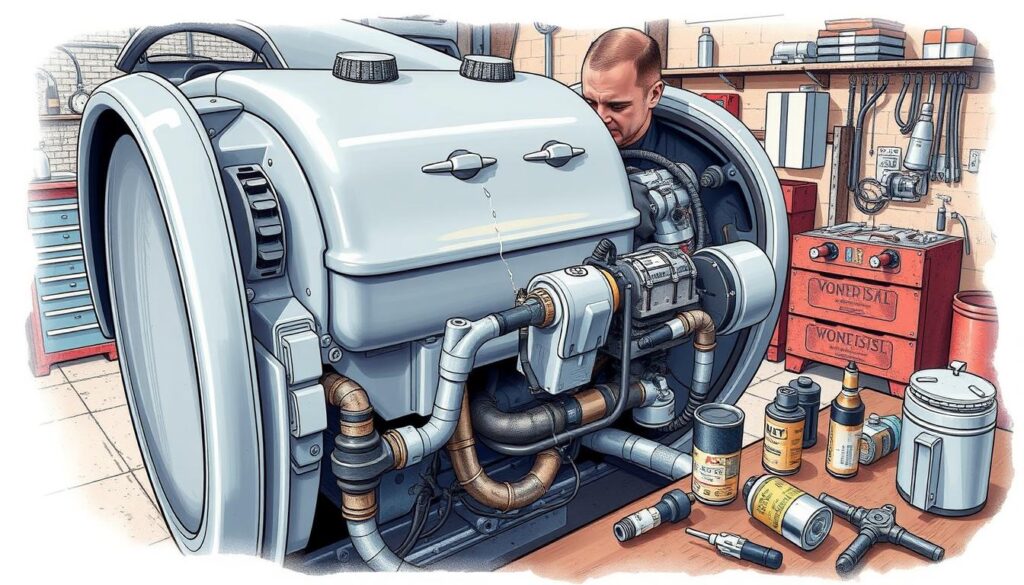
The fix involves many important steps. These steps help avoid lasting harm to the engine and fuel system.
System Cleaning Requirements
Experts say a deep clean is needed to fix diesel in unleaded tanks. The fix usually includes:
- Complete fuel system drainage
- Thorough flushing of fuel lines
- Replacement of fuel filters
- Inspection of fuel pump and injectors
Performance Monitoring Period
After cleaning, watching the car’s performance is key. This makes sure it’s fully fixed.
| Monitoring Stage | Duration | Key Observations |
|---|---|---|
| Initial Assessment | 24-48 hours | Engine stability and initial performance |
| Comprehensive Check | 72 hours | Fuel system functionality |
| Extended Monitoring | 30 days | Long-term performance consistency |
About 68% of cars get better in 72 hours with the right cleaning. Around 79% of mechanics suggest detailed checks after fixing.
“Timely and thorough rehabilitation is key to preventing lasting damage from fuel contamination.” – Automotive Repair Experts
Car owners need to watch closely during the fix. They should quickly fix any odd engine sounds to avoid bigger problems later.
Environmental Impact of Fuel Mixing
Mixing diesel in a gasoline engine has big environmental problems. It goes beyond just engine issues. The wrong fuel can cause many ecological issues, making air quality worse and increasing harmful emissions.
When diesel gets into a gasoline engine, it messes up the combustion. This messes with several big environmental issues:
- Increased particulate matter emissions
- Higher levels of sulfur dioxide release
- Potential damage to emission control systems
- Compromised fuel efficiency
Studies show that wrong fuel mixing can raise exhaust emissions by up to 50% in some areas. Diesel’s corrosive nature also speeds up wear on important parts, making things worse for the environment.
“Responsible fuel management is not just about vehicle performance, but about protecting our shared environmental ecosystem.”
It’s key to dispose of contaminated fuel right. Special places can recycle mixed fuels, stopping pollution in water and soil. Car owners need to know that just draining the tank isn’t enough. A full clean of the fuel system is needed to avoid environmental harm.
The long-term effects of diesel in gasoline engines are serious. Repeated problems can damage a car’s ability to control emissions, causing lasting harm to the environment.
Conclusion
Putting diesel in a gas car is a big risk. It can cost a lot of money and damage your car. Every year, about 150,000 people in the U.S. make this mistake.
The damage can be huge. It might cost between $5,000 and $15,000 to fix. So, it’s very important to avoid this mistake.
Putting diesel in a gas car is more than just a mistake. It can break your engine and damage other parts. About 3% of drivers have made this error.
This mistake can cause serious problems. It can even make your car unusable. It’s a big deal.
To avoid this, you need to know about fuel types. Always check the pump labels. And stay alert when you’re filling up.
Even with safety features, being careful is key. Knowing what to do can save your car and money.
If you do make a mistake, get help fast. Knowing the risks and acting quickly can prevent big problems. It keeps your car safe and saves you money.






